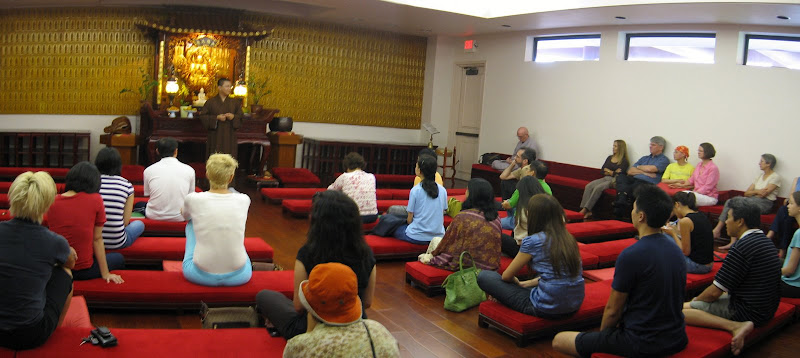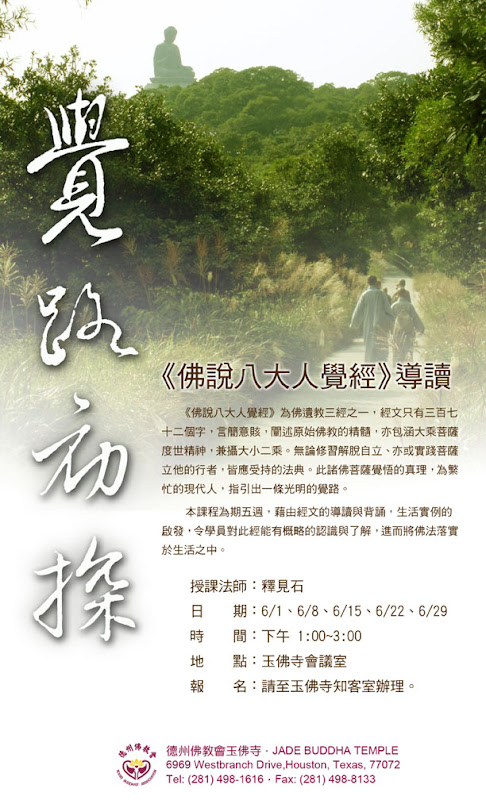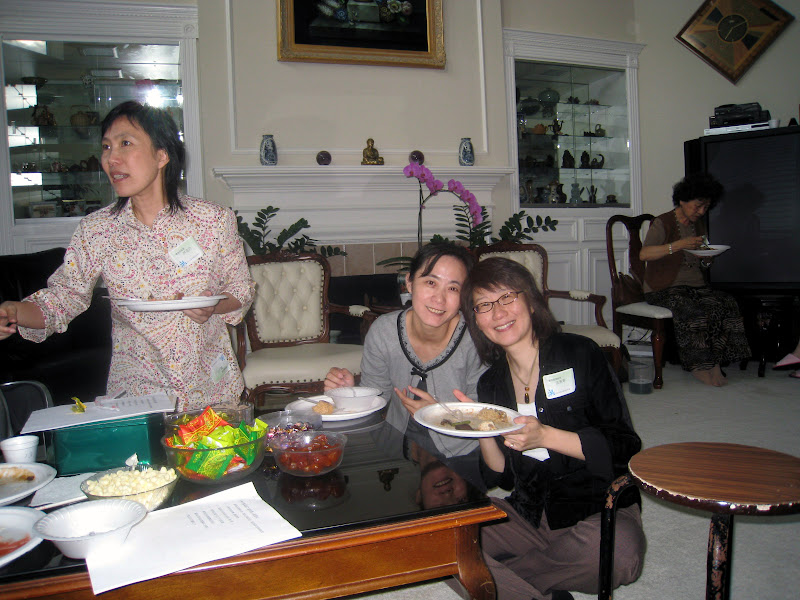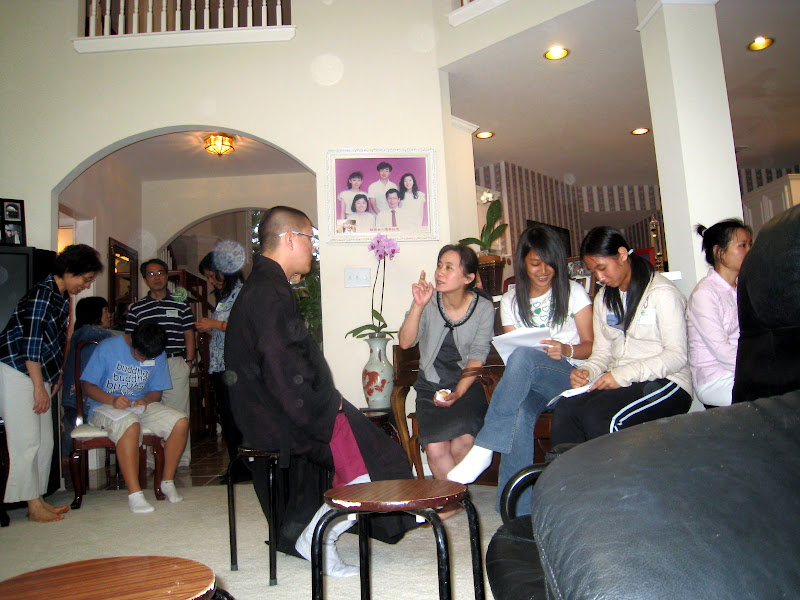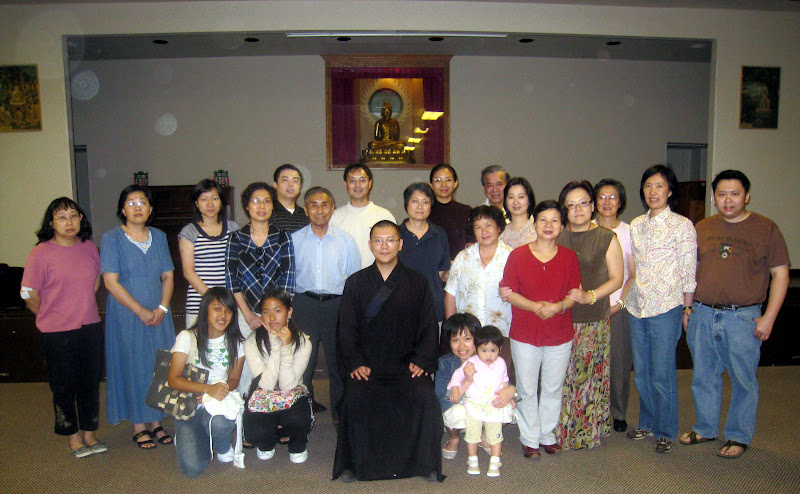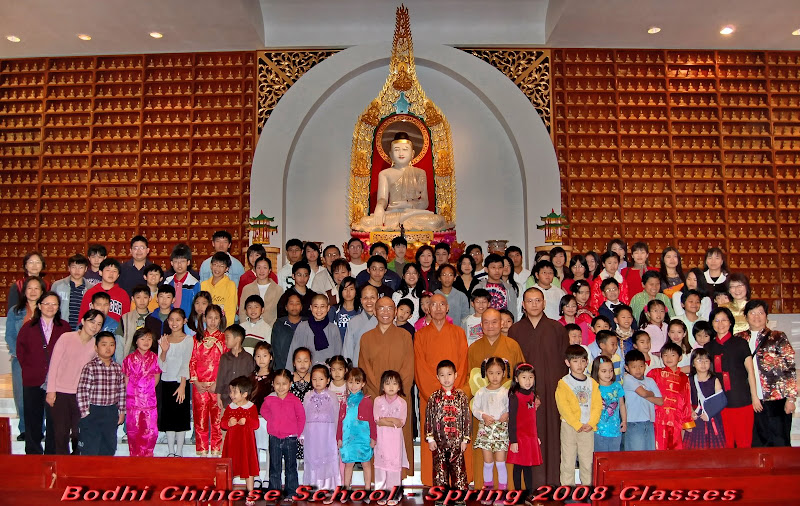
Master Jian Dan delivered an interactive talk at University of Houston to a group of undergraduate students about Buddhism and meditation.
Master explained that Buddhism is more of a way of living than a religion and that Buddha is a person who has reached a pure state of mind, a state that we all can achieve. Buddhism believes that we all have this original, pure Buddha nature. Unfortunately, due to attachments, this original, pure mind is deluded with wondering thoughts. Meditation is a tool, a practice, a skillful means, to help us settle down our attachments and reach the mind of tranquility.
So, how can meditation help?
Water Demonstration
Master Jian Dan brought out a big glass tube of water. “This is your original, pure mind. It is clear and calm.” Then he started pouring some red beads into it. “This is your anger when you argue with your girlfriend or boyfriend.” As the beads traveled down the glass tube, Master used a stick to stir them up. “But you cannot let go of your anger. The more you think about it, the angrier you become.” Master poured another bag of purple beads into the tube. “This is your sadness when you received a bad grade from school.” Another bag of blue beads were poured into the water. “This is your children when they do not listen to you.” Master continued to stir the water so all the beads were in a whirlpool, unsettled, restless. “Different color beads represent different emotions. When you give them energy by continue to think about them, they cloud your mind and you cannot see clearly.” Master Jian Dan continued, “So how can you calm your mind? You let thoughts settle down. You let the beads sink to the bottom by not stirring them. Learn to control your mind and ignore all wondering thoughts.”
This water example really helped students make the connection between meditation and clearing our mind. One student wrote on her survey, “The water demonstration was very insightful. It made it much easier to visualize how to clear your mind and let your thoughts go.” Another student echoed, “The explanation of how the mind is like clear water and then you add in the beads that represent thoughts and emotions, all stirred up. That made me think about the clear mind in a different way.”
Conversations between the Master and the students
Two guided meditations were offered where Master taught students the basic breath-counting method. After the meditation, students were eager to ask questions. Below is a snapshot of some of the questions and answers from today’s talk.
 Student: Can a Buddhist monk get married?
Student: Can a Buddhist monk get married?
Master: No.
Student: How old are you?
Master: It is a secret.
Student: How many colors are there in a monk’s robe?
Master: Black, brown and grey as they were considered “dirty” or “bad” colors in ancient time. Black becomes a fashion now but people did not like it before. Wearing undesirable colors is also a training to detach from material desires.
Student: Are you paid to be a monk?
Master: No, but according to the Chinese tradition, we accept offerings from laid disciples. It is also because of this tradition, when I get sick, I keep my mouth shut. Otherwise I will receive a lot of medicines from people.
Student: Why breath-counting method?
Master: There are different techniques but breath-counting is the easiest and safest to practice without a teacher. In addition, we usually are not attached to a number so later we can even easily let go of the numbers.
Student: It is very hard to ignore thoughts during meditation.
Master: That is why we call meditation a practice. Learn to give your mind the strength to ignore thoughts. We simply do not follow our thoughts and make a story out of it. Once we ignore a thought, it loses it energy and it will eventually disappear.
Student: Why is it a good thing to not to attach to things?
Master: When you are attached, you are limiting your world view to only the attachment. When you are free from the attachment, you are open to see the whole picture, therefore the truth. In reality, learning Buddha’s teaching or even counting the breath are also forms of attachment. Eventually we will have to “empty our emptiness.” At that point, we cease reincarnation.
Student: What is reincarnation?
Master: It is the arising (birth), falling away (death), and the recurrence of our thoughts. The same thought keeps coming back and we cannot jump out of this endless loop of suffering. True understanding of reincarnation lies in the awareness of the function of our mind.
Students: What are the differences among different schools of Buddhism?
Master: The basic concepts are the same but each school has adapted to different cultures. In 50 years, American will have its own unique variation of Buddhism.
Student: Are there hierarchy in monks?
Master: Not in Buddhism but since we respect our teachers, we might call them the Grand Master.
Student: Do you dress this way 24 by 7?
 Master: When I was in Taiwan, yes. In America, it is a little more flexible so I will change to plain attire when exercising. The way we dress also distinguishes us from others. However, in 10 years, maybe this will change too.
Master: When I was in Taiwan, yes. In America, it is a little more flexible so I will change to plain attire when exercising. The way we dress also distinguishes us from others. However, in 10 years, maybe this will change too.
Student: If I just don’t like certain vegetables, am I supposed to like them according to Buddhism?
Master: Like or dislike are still from attached standards. They are attachments. One analogy we often use is to say that our mind should be like a mirror. A mirror reflects what is in front of it without picking and choosing, liking or disliking. A mirror clearly knows the object in front of it and reflects the truth.
Student: If I like to follow the Buddha’s path, what do you suggest?
Master: Find a temple or center close to you and find a good teacher.
Student: good or bad aren’t them the same if we follow Buddhism’s concept where there is no duality?
Master: Like a baby learning how to walk. The baby has to first rely on the walker or the wall. Likewise, we will have to fist rely on the “good” to help get rid of the “bad.” You will not be able to learn anything if the teacher is no good.
Student: I have road rage. How can I get rid of it?
Master: Find an excuse for the other person. He or she might have an emergency. Secondly, I want to treat myself nicely. I don’t want to treat myself with anger.
Student: Is it difficult to be a monk in the west?
Master: It is difficult to be a monk in the east since we have to carry a lot of traditional burdens. It is more flexible here with more possibilities.
Overall reflections
Overall, students seemed to enjoy the talk and the meditation training. They find the talk “informative” “enjoyable” “educational” “very enlightening and very insightful. I plan on implemented some of the Master’s teachings into some of my own teachings” “I really liked his examples” “Master was very interesting. He really tried his best to explain and answer all questions.”
While some felt the talk “gave me a new outlook about Buddhism,” and “I will seek more information … so I can further myself,” many unanswered questions still lingered in students’ mind. For example, one student felt s/he liked to know “how American society reacts to Buddhism.” Yet another wanted to know “the difficulties monks encounter in the US compared to their country.” One student indicated s/he liked to know more about “how Buddhists live and do everything and how to teach children/others about Buddhism” This question was reiterated by another student, who wrote “I would have liked to know how a person implements this in their daily life.”
Master enjoyed the talk as much as the students did.
 This semester, Master spent a great deal in discussing each of the six paramitas (giving, virtue, tolerance, diligence, concentration and insight). Master emphasized the multi-facet understanding of each paramita and the practical ways to implement them in our everyday lives. Master’s teaching was well received, as evident by an impressive record of attendance. Nineteen (19) attendees attended eight (8) or more classes and received a certificate of completion. In addition, nine (9) attendees managed to attend all classes. Those with perfect attendance received a special rosary from the Master as an encouragement to their diligence.
This semester, Master spent a great deal in discussing each of the six paramitas (giving, virtue, tolerance, diligence, concentration and insight). Master emphasized the multi-facet understanding of each paramita and the practical ways to implement them in our everyday lives. Master’s teaching was well received, as evident by an impressive record of attendance. Nineteen (19) attendees attended eight (8) or more classes and received a certificate of completion. In addition, nine (9) attendees managed to attend all classes. Those with perfect attendance received a special rosary from the Master as an encouragement to their diligence. Shortly after the certificate ceremony, the group moved to a newly opened coffee shop to continue the dharma discussion and celebration. Over 60 people gathered, including family members, children and new born babies. All students earnestly request to hear the spring class schedule soon.
Shortly after the certificate ceremony, the group moved to a newly opened coffee shop to continue the dharma discussion and celebration. Over 60 people gathered, including family members, children and new born babies. All students earnestly request to hear the spring class schedule soon.








.jpg)


